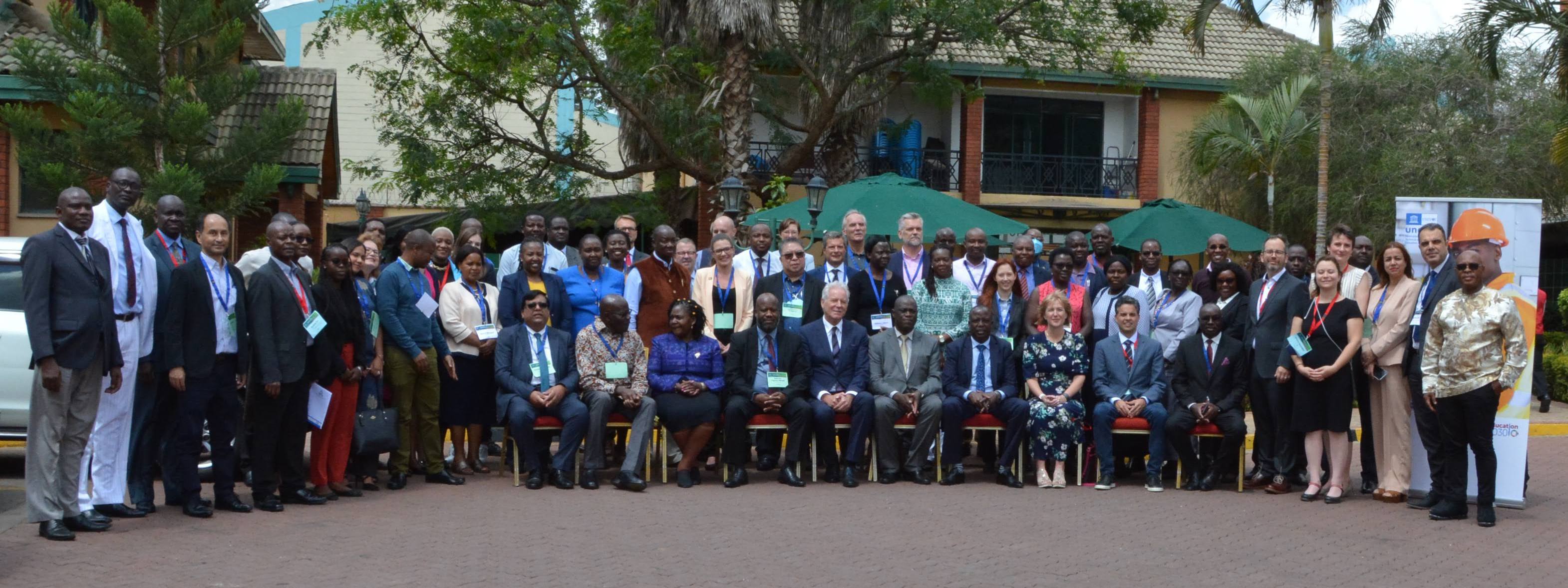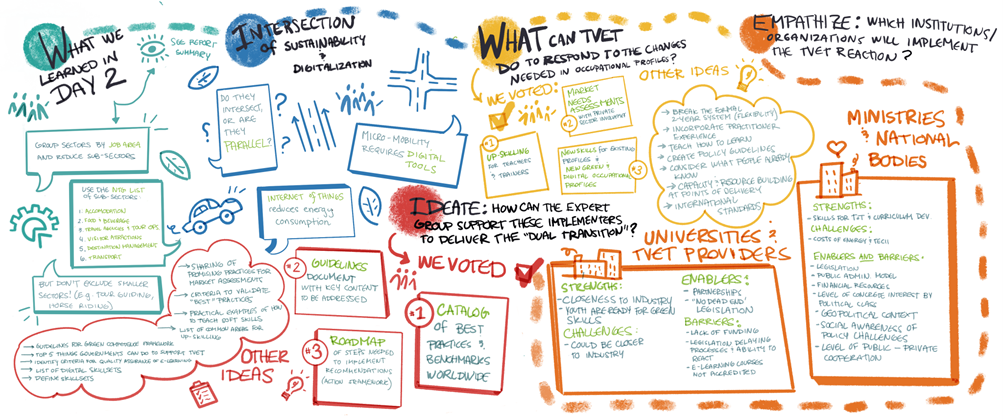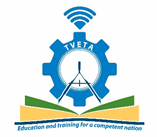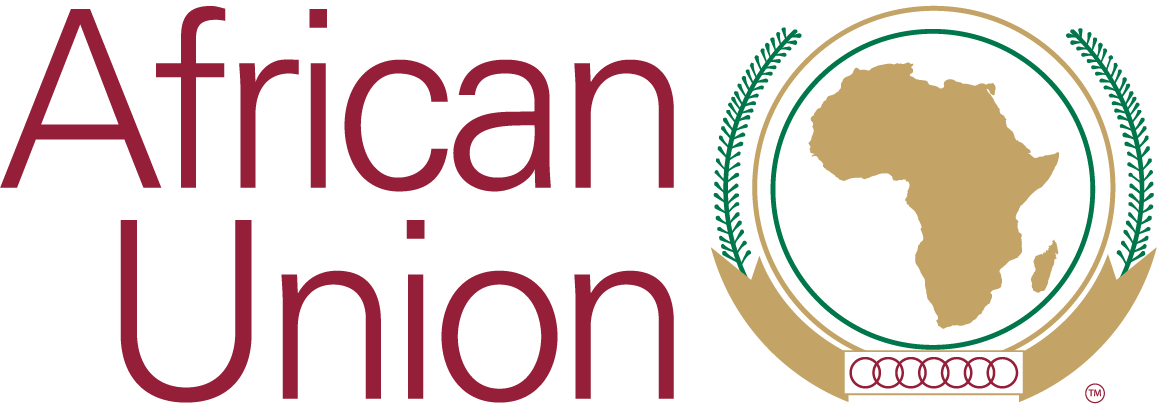About BILT: Our approach | Themes | Who we are
Get involved: News and events | BILT community | Expert group | Self-Reflection Tool
Knowledge base: Innovative and promising practices | Atlas of emerging trends | BILT library | TVETipedia

The conference brought together 57 global TVET actors including training providers, policy-makers, national bodies and industry representatives at the Boma conference centre to jointly address the growing demand for green and digital competencies in the hospitality and tourism sector. More than 200 online participants joined the broadcast and made their contributions to the discussions via a virtual conference platform.

A new digital resource, Atlas of emerging trends in new qualifications and competencies in TVET, was launched on the first day of the conference to provide background for the peer-learning sessions.
The Atlas builds on the findings of a 2021 BILT survey and brings together the latest data and trends in relation to the identification, integration, and implementation of emerging green and digital skills in the African context. TVET practitioners are invited to consult this resource, which offers case studies and opportunities for action, to build modern TVET systems and respond to major shifts in the world of work.
To further stimulate inter-regional knowledge exchange, the BILT Atlas will shortly be expanded to cover the Asia-Pacific and Europe regions.
How is the movement towards digitalization and greening changing the hospitality and tourism sector?
A major trend resulting from the digital transformation is increased efficiency, including automation of certain tasks, reduced costs, increased convenience for guests, and enhanced accountability and transparency. Furthermore, companies gain a better client reach and exposure due to the incorporation of digital tools and platforms. Driven by the growing demand for sustainability, customers become more conscious about their decisions and the efforts made by industry to contribute to green societies and economies.
Occupational profiles would have to change substantially with the movement towards the dual green and digital transition. In many cases, the transition requires a whole new skillset for employees within the sector. An overwhelming number of conference participants stressed the need for investment in order to upskill the current workforce and to keep up with the demand for digitalization and sustainability.
From reflection to action: BILT expert group on dual green and digital transition (2023-24)
A main goal of the conference was to define the scope and focus of a new BILT expert group, which will support TVET implementers to deliver the dual transition in the tourism and hospitality sector.
To address changes in occupational profiles caused by the dual transition, some of the key action priorities set by experts were the upskilling of teachers and trainers, and the undertaking of market needs assessment in collaboration with the private sector. To support TVET implementers in this regard, the expert group proposed establishing a guiding document with key content to be addressed, as well as publishing a catalog of best practices and benchmarks worldwide.

The members of the BILT Community and other interested TVET stakeholders are invited to join the Bridging Event for Asia and the Pacific in June 2023 and the BILT Learning Forum in Bonn, Germany, in November 2023 (tbc). The focus sector and themes will continue to be green and digital qualifications and competencies for hospitality and tourism. In the meantime and throughout the year, BILT will identify and publish relevant innovative practices and carry out Learning Labs to support TVET stakeholders in their efforts to modernize their TVET systems.
Please subscribe here![]() to receive news updates and invitations to upcoming events. You can also keep up with BILT activities by following us on Twitter: @UNEVOC.
to receive news updates and invitations to upcoming events. You can also keep up with BILT activities by following us on Twitter: @UNEVOC.

- a UNEVOC Centre -
and co-hosted by
the African Union

Moderator: Ms Natalie Ax, BILT Project Officer, UNESCO-UNEVOC
Moderator: Ms Natalie Ax, BILT Project Officer, UNESCO-UNEVOC
New qualifications and competencies for green and digital TVET – Group Sessions
The objective of this session is to share and discuss solution-oriented approaches and innovations from a country, stakeholder and practitioner perspective. The discussion will be based on the challenges and opportunities presented in the BILT Atlas. Context for the discussion will further be provided by sharing examples from group participants.
Speaker: Stephanie Allais, Director of the Centre for Researching Education and Labour, School of Education of the University of the Witwatersrand, South Africa
GROUP SESSION 1: ‘Digital and green skills policies’, Mr Michael Schwarz, BIBB, Germany
Moderator: Ms Cara Schmitt, BILT Project Officer, Federal Institute for Vocational Education and Training (BIBB), Germany
Presentation BILT Peer Learning Wheel
Matchmaking Session I
The matchmaking sessions serve to illustrate examples of successful and innovative TVET practice and offer an opportunity of thematic exchange and collaboration among institutions from Africa, AsiaPacific and Europe, as per the BILT Peer-Learning Wheel. Participants will join a session of their choice and have a chance to explore collaboration opportunities.
Group 1: ‘Promotion of Research, Innovation, Greening and Digitalization in Kenyan TVET institutions’, Mr Otta Osawa, Technical and Vocational Training Authority (TVETA), Kenya, Presentation
Group 2: ‘Empowering Mauritius towards a green Destination’, Mr Kamaraj Nosib, Mauritius Institute of Training and Development (MITD), Mauritius, Presentation
Group 3: ‘Development of a Dual Vocational Online Training System in Hospitality’, Ms Iris Neumann, Kambaku Hospitality College, Namibia, Presentation
Matchmaking Session II
Group 1: ‘Innovative approach to greening TVET using technology and digitalization’, Mr Edwin Tarno, Kenya Technical Trainers College (KTTC), Kenya, Presentation
Group 2: ‘Training of Trainers and Training Engineering in Tunisia’, Ms Sana Darmoul, National Center for the Training of Trainers and Training Engineering (CENAFFIF), Tunisia, Presentation
Group 3: ‘Digitalization and Greening in TVET Hospitality Education – The Gambian Experience’, Mr Momodou Singhateh, The Gambia Tourism and Hospitality Institute, The Gambia, Presentation
Opening ceremonyModerator: Mr Kipkirui Langat, Director General, Technical and Vocational Education and Training Authority (TVETA), Kenya
Moderator: Mr Wilson Lima Junior, BILT Project Manager, UNESCO-UNEVOC
Announcement of the BILT expert group on the dual green and digital transition by the expert group leads.
Hosted by Mr Lorenzo E. L. Guillermo, TESDA, Philippines
Short presentation of the Next Tourism Generation Alliance (NTG) by Klaus Ehrlich as a springboard to discuss and identify priorities and common challenges across the three regions.
Design Thinking Workshop 2: TVET for digital hospitality and tourism
Hosted by Mr Erik Swars, SFUVET, Switzerland
Short presentation of the Next Tourism Generation Alliance (NTG) by Rino Vitelli as a springboard to discuss and identify priorities and common challenges across the three regions.
Welcome and KeynoteModerator: Mr Wilson Lima Junior, UNESCO-UNEVOC
Innovative practices ‘digitalization and the inclusion of migrants’
Moderator: Ms Cara Schmitt, BIBB, Germany
Moderator: Ms Cara Schmitt, BIBB, Germany
The BILT project is implemented by
with support of
and sponsored by